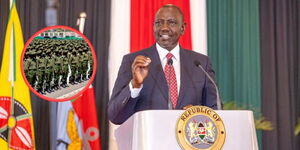Teachers attending the 10th African Confederation of Principals (ACP) Conference in Mombasa on Tuesday gifted President Uhuru Kenyatta with two gifts.
Shortly after the Head of State delivered a speech, the team gifted him with a book and a certificate of appreciation, but its the former that drew our attention.
The book titled Leading Minds: An Anatomy of Leadership by Howard Gardner offers a fresh insight into the lack of skilled, constructive leadership that has resulted in a global leadership crisis.
[caption caption="President Uhuru receiving the gifts from the African Confederation of Principals (ACP)"] [/caption]
[/caption]
Among the things that the book Uhuru received covers is an in-depth look at eleven great leaders identifying a number of recurring elements critical to effective leadership.
"In these trying times, we can take inspiration from individuals, who ignored conventional wisdom and risked defeat, rejection and obscurity to pursue the ideas they believed in, but more than that, we can glean wisdom from their individual and collective experiences," a prelude to the book reads.
According to Gardner, a leader is "an individual who significantly affects the thoughts, feelings and behaviour of a significant number of individuals."
Among the exemplary leaders, Gardner identifies is former UK Prime Minister Winston Churchill, physicist Albert Einstein and civil rights crusader Martin Luther King, Jr.
Other leaders reviewed in the latest addition to Uhuru's library is Mahatma Gandhi, Margaret Mead, Robert Oppenheimer, Robert Maynard Hutchins, Alfred Sloan, George Marshall, Pope John XXIII, Eleanor Roosevelt, Jean Monnet, and Margaret Thatcher.
Gardner quotes Field Marshall Bernard Montgomery "My own definition of leadership is this: The capacity and the will to rally men and women in a common purpose, and the character which inspires confidence".
In Leading Minds, Gardner identifies six key features integral to effective leadership that include: a central story or message, an audience ready to hear the story, some kind of institutional or organizational basis, taking an embodiment to the story, the transition from direct to indirect leadership, and the ability to solicit for technical knowledge when need arises.
"All leaders fashion stories, simplified narratives that help people think about who they are, where they came from and where they are headed," Gardner.
[caption caption="President Uhuru Kenyatta at the African Confederation of Principals (ACP) Conference in Mombasa"] [/caption]
[/caption]
The author further notes that based on their stories, it is possible to deduce three categories of leaders: the ordinary (Gerald Ford), the innovative (Charles de Gaulle) and the visionary (Jesus Christ).
"An ordinary leader does not stretch the consciousness of his audience; he merely piggybacks on an already entrenched story.
"An innovative leader takes a story that has been latent and brings new attention to it; he tries to recapture the glory and innocence of earlier times," the writer elaborates.
Gardener, however, notes that a visionary leader creates a new story and but any effective leader must show a tie to the community, a certain rhythm of life, an evident relationship between stories and embodiment, and allowing his followers to exert some sort of choice.
Looking forward, Gardner offers advice on the future leadership including the need to appreciate enduring features of leadership, anticipating and dealing with new trends, and encouraging recognition of problems, paradoxes and possibilities of leadership.
[caption caption="President Uhuru mingling with the attendees of African Confederation of Principals (ACP) Conference in Mombasa"] [/caption]
[/caption]
In conclusion, Gardner highlights that the future trends that leaders should be aware of include: the potential for global destruction, instant communication, absence of privacy, the rise of entities that transcend national boundaries, nationalistic and fundamentalist reactions, and the need for more technical expertise owing to the spectacular accumulation of knowledge in all life domains.
Why the Principals settled for such an intriguing read for the Head of State who is serving his last term in office remains a subject of debate.












